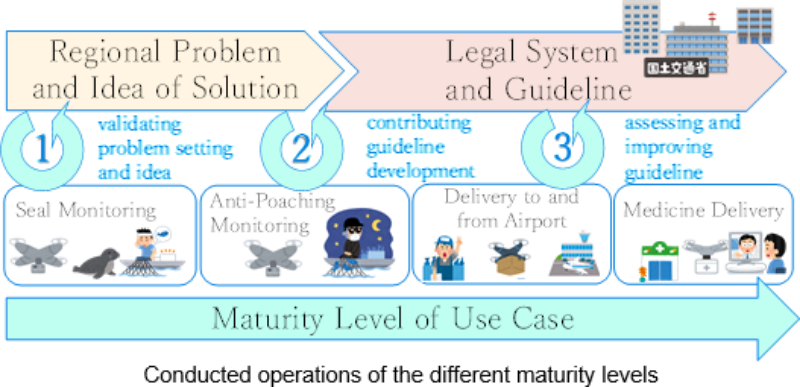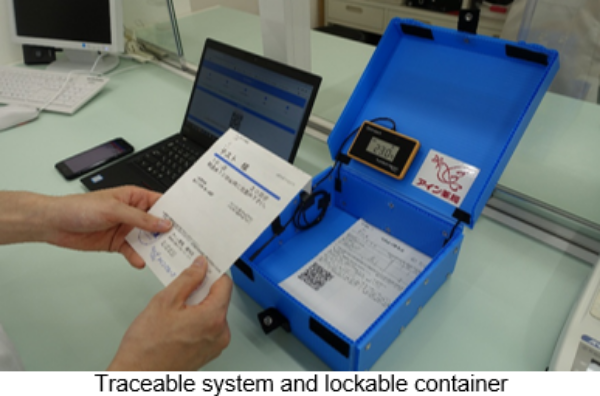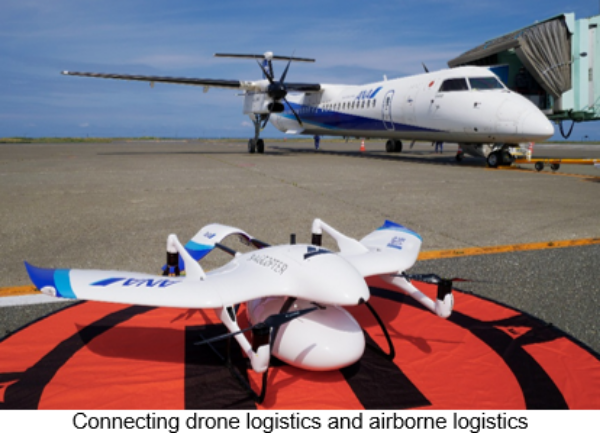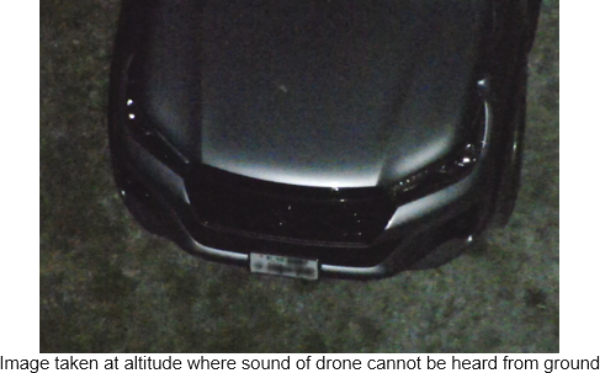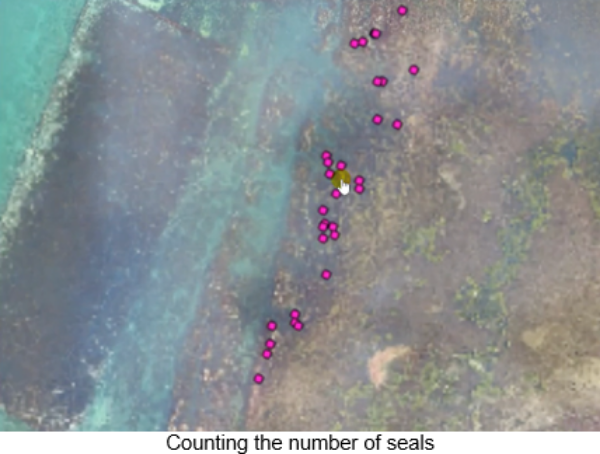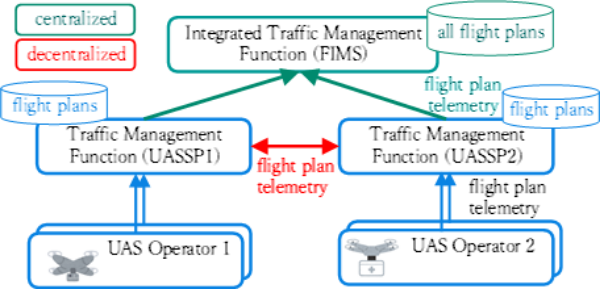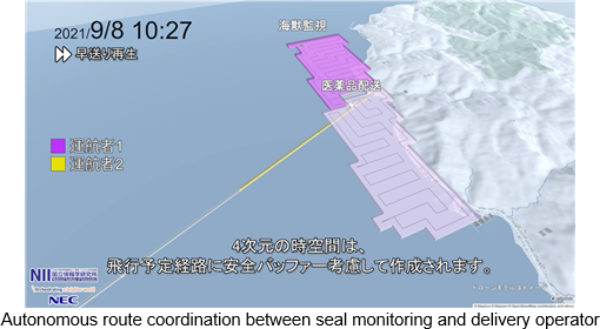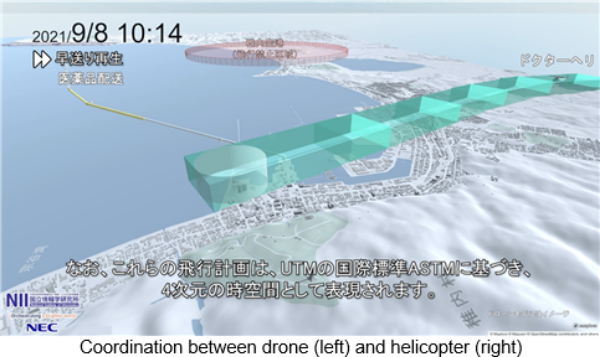Several leading Japanese technology firms, including BIRD INITIATIVE, Inc. 1, ANA HOLDINGS INC.2, AIN HOLDINGS INC. 3, and NEC Corporation,4 have partnered with the Hokkaido Bureau of Economy, Trade and Industry 5 to conduct a drone operations pilot project in Wakkanai City, Hokkaido prefecture.
Tests conducted examined the ability of drones to deliver pharmaceutical supplies to remote areas in accordance with the “Guidelines for Pharmaceutical Supply Delivery using Drones,”6 and to operate at passenger airports using the decentralized UAS Traffic Management (hereinafter “UTM”)7. UTM enables multiple drone operators to operate drones safely and efficiently within the same airspace. All of the tests were held in accordance with existing Japanese regulations and guidelines for drone use.
These successful pilots were conducted as part of the “Drones and Robots for Ecologically Sustainable Societies project” (hereinafter referred to as the “DRESS Project”)8, a project entrusted to Persol Process & Technology Co., Ltd. by the New Energy and Industrial Technology Development Organization (hereinafter “NEDO”). With BIRD INITIATIVE acting as the representative, Digital Hokkaido Research Association (hereinafter “Hokkaido Drone Association”), FRS Corporation, HELICAM Corporation, the National Institute of Informatics of the Research Organization of Information and Systems (hereinafter “NII”), and Tokio Marine & Nichido Fire Insurance Co. together conducted the experiment from September 7 to October 30, 2021.
Utilizing Drones to Address Unique Regional Issues
Drones offer exciting new possibilities, but their full potential is limited by restrictions on their ability to fly beyond the visual line of sight (BVLOS) of their operators. BVLOS operations are currently limited to remote islands, mountainous areas, and sparsely populated areas. The DRESS project was launched in 2017 in an effort to gain approval for BVLOS flights in populated areas, also known as Level 4 flights, by FY2022. The results from the Wakkanai tests could help achieve this goal. The tests in Wakkanai each held different purposes aimed to resolve challenges that still affect drone operation – implementing new ideas to solve regional issues (seal monitoring), establishing guidelines (combatting fisheries poaching), addressing practical issues for already legalized operations (takeoff and landing at passenger airports), and improving guidelines (delivery of pharmaceutical supplies).
Drone Delivery of Pharmaceutical Goods in Accordance with the Guideline
In June 2021, the Cabinet Secretariat, the Ministry of Health, Labour and Welfare, and the Ministry of Land, Infrastructure, Transport and Tourism formulated the “Guidelines for Pharmaceutical Delivery Using Drones”. The use of drones to deliver pharmaceutical supplies could help provide critical medical care in remote areas. While patients can currently receive pharmaceutical supplies through traditional parcel services after receiving online medical treatment and online medication guidance, deliveries can often take several days in remote areas. AIN HD, ANAHD and the Hokkaido Bureau of Economy, Trade and Industry partnered to conduct a pilot program that tested the effectiveness of pharmaceutical delivery via drone platforms, the first in Japan based on the Guidelines. AIN HD provided the prescribed medicines as well as online medication guidance to participating patients after the patients received online medical treatment from the Wakkanai City Hospital, while ANAHD delivered the selected pharmaceuticals by drone.
The trials resulted in the codification of new guidelines that require key measures such as attaching locks to containers to ensure they are only opened by the intended recipient, and Toppan Forms Co., Ltd. provided lightweight and lockable containers.
Drone Deliveries at an Airport with Scheduled Airline Flights
ANAHD collaborated with the Hokkaido Airports Corporation (“HAP”) to conduct Japan’s first trial program to fly delivery drones to and from airports with regularly scheduled flights. The experiment explored the connection between drone logistics and airborne logistics by flying a delivery drone to and from Wakkanai Airport, as well as within and outside of the immediate airport area. As both of these formats are increasingly leveraged to provide increased logistical efficiency, drones and traditional air travel will enable rapid and consistent cargo transport from rural areas to urban areas. The trial program also highlighted the potential of new logistics networks using airports as the basis for a hub-and-spoke model.
BVLOS Operation for Anti-Poaching Monitoring
Poaching in Hokkaido and many other parts of Japan creates a range of negative consequences, including economic damage to the fishing industry. To address this, Helicam worked with the Wakkanai Police Station and the Hokkaido Drone Association to detect, deter and prosecute poaching using a drone with a thermal infrared camera, a spotlight and a loudspeaker. The successful tests yielded valuable information that will help the local fishing cooperatives collaborate with the police and the city government to protect their livelihood.
Drone for Seal Monitoring
In Wakkanai, the fishers rely on nets to capture fish, but local seals pose a serious problem as they often chew through the nets to eat the catch for themselves. For this reason, it is critical to local industry to monitor seal movements. Researchers are typically able to only observe seals when they are on land. However, in a recently-completed pilot program, FRS operated drones were used to monitor seals both in land-based colonies and as they swam in proximity to fishing nets, with the cooperation of the Hokkaido Drone Association.
Demonstration of Decentralized UTM Being Standardized Globally
In the DRESS project, Traffic Management Function is connected to Integrated Traffic Management Function, and all available flight path information is aggregated to eliminate potential conflicts between flight plans. In addition, the project also conducted first-of-its-kind tests in Japan for decentralized UTM which is being standardized globally. In this federated system, a service provider can decide whether or not to accept a flight plan by coordinating with other service providers. BIRD INITIATIVE operates this function with the cooperation of ANRA TECHNOLOGIES, which is leading the international standardization9. NEC and NII also set up this system as Digital Twin. In addition, Tokio Marine & Nichido Fire Insurance Co. analyzed risks associated with drone flights by using UTM.
Digital Twin and Automated Negotiation for Strategic Negotiation
Successful decentralized UTM relies on the ability to automatically formulate, negotiate and adjust a flight plan that can be agreed upon with other operators. NEC has collaborated with NII to create an accurate virtual rendering of Wakkanai City as Digital Twin to develop verified autonomous route coordination between seal monitoring and logistics. NEC and the National Institute of Advanced Industrial Science and Technology (AIST) also partnered to jointly develop the negotiation technology for logistics.
Coordination of Flight Plans Between Drones and Emergency Medical Helicopters
ANAHD, NEC, and NII utilized the FORSER-GA service provided by Weathernews Inc. to verify the detection and resolution of overlapping flight plans through the use of flight management services, assuming a manned aircraft flight environment. The Digital Twin was developed to coordinate flight plans between aircraft and drones, as well as between emergency medical helicopters and other manned aircraft.
The participating parties will utilize the results of the above initiatives and contribute to the realization of Level 4 flights in populated areas.
-
1: BIRD INITIATIVE, Inc. Head office: Chuo-ku, Tokyo; President and CEO: Masamitsu Kitase
-
2: ANA HOLDINGS, INC. Head office: Minato-ku, Tokyo; President & CEO: Shinya Katanozaka
-
3: AIN HOLDINGS INC. Head office: Sapporo, Hokkaido; President and Representative Director: Kiichi Otani
-
4: NEC Corporation, Headquarters: Minato-ku, Tokyo; President and CEO: Takayuki Morita
-
5: Hokkaido Bureau of Economy, Trade and Industry Location: Sapporo, Hokkaido; Director General: Shigetoshi Ikeyama
-
6: “Guidelines for Delivery of Pharmaceutical Supplies Using Drones”
https://www.kantei.go.jp/jp/singi/kogatamujinki/kanminkyougi_dai16/betten3.pdf -
7: UTM (UAS Traffic Management) is a system of systems that manages the operation of UAS (Unmanned Aircraft System, drone). For the DRESS project, an architecture is being considered in which the UASSP (UAS Service Provider), which provides operational services to UASO (UAS Operators), is centrally managed by FIMS (Flight Information Management System). In the United States, an architecture in which the USS (UAS Service Supplier), which corresponds to the UASSP, is connected to each other in a decentralized manner is being considered, and in Europe a decentralized coordination between the USP (U-Space Service Provider) is being considered as well, mainly in Switzerland.
-
8: Project for realizing an energy-saving society where robots and drones are active; Drones and Robots for Ecologically Sustainable Societies project (DRESS project)
https://nedo-dress.jp/
-
9: ASTM International
Source: Press Release


